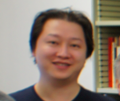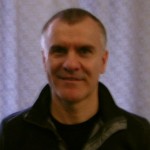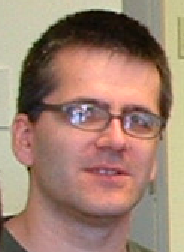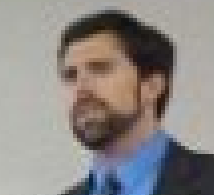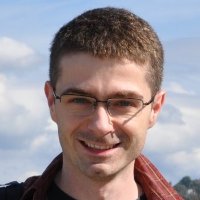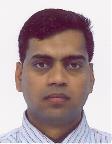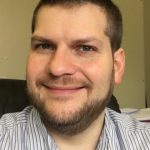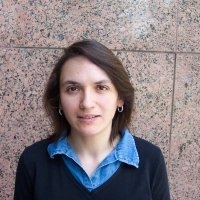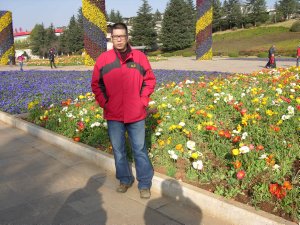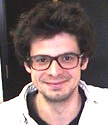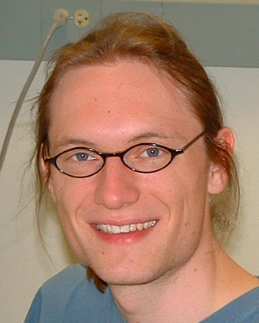| Name | Description | Picture | ||||||
|---|---|---|---|---|---|---|---|---|
| Jia wang |
Jia joined our group as a postdoc after obtaining his Ph.D.
with Chris Greene in his group at
JILA.
He worked on Rydberg excitations to tune chemical reactions, and on
electron-phonon interactions in a degenerate Bose gas. He found that
the exchange of phonons would lead to attractive forces between
Rydberg atoms described by Yukawa interactions.
Jia is now at the Centre for Quantum and Optical Science, Swinburne University of Technology (Australia) since April 2015. |
|
||||||
|
Sandipan Banerjee Ph.D. 2013 Thesis |
During his Ph.D., Sandipan worked on calculating properties
(potential energy surfaces and transition moments) of alkaline-earth
diatomic molecular ions, paying special attention to their long-range
interactions. He also investigated gold clusters.
After a brief postdoc at Yale in the group of Victor Batista in 2013, Sandipan joined Intel as a TD Module & Integration Yield Engineer in September 2013. |
|
||||||
|
Jason Byrd Ph.D. 2013 Thesis |
During his Ph.D., Jason worked on various aspects of quantum chemistry
related to ultracold systems. He computed intermolecular van der Waals
interactions using TD-DFT and GAMESS, the effect of weak electric fields
on diatomic interactions, small alkali cluster thermochemistry and
reaction pathways, and ways to tune reactions using optical fields.
In July 2013, he joined the Quantum Theory Project (University of Florida) as a postdoc, working on highly scalable and efficient linear sparse tensor operations, approaches to calculate arbitrarily large systems with ab initio methods, and on the ACES3 and Aces IV massively parallel quantum chemistry programs. Since May 2016, he became Associate Scientist II at ENSCO, Inc.. |
|
||||||
|
Ionel Simbotin Ph.D. 2012 Thesis |
During his Ph.D., ionnel worked on atom-diatom reactive scattering at
ultracold temperatures. In particular, he explored benchmark
reactions with barrier between H2 and D, and Cl, to
produce H and HD, and HCl.
After his Ph.D., Ionel worked with Vasili Kharchenko on atom-diatom scattering in system of astrophysical interest, and rejoined our group as a postdoc, now working on Near Threshold Reosnances (NTR). |
|
||||||
|
Zoran Pavlović Ph.D. 2011 Thesis |
During his Ph.D., Zoran worked on dipolar collisions in cooling and trapping of paramagnetic atoms. In particular, he explored a system with a large magnetic dipole moment, Cr, between different combinations of the bosonic isotope 52Cr and the fermionic 53Cr. The interplay between the long-range dipole-dipole magnetic interaction and the hyperfine structure (when present) gives a very rich set of Feshbach resonances. In addition, he investigated the scattering properties of Cr+Rb, as well as He+OH(2Π). |
|
||||||
|
Nolan Samboy Ph.D. 2011 Thesis |
During his Ph.D., Nolan worked in the interaction between Rydberg atoms.
In particular, he explored how Rydberg-Rydberg interactions are
affected by weak electric fields. He also investigated macrodimers
and macrotrimers, made of two or three bound Rydberg atoms.
After graduating, Nolan held Visiting Assistant Professor of Physics positions at Quinnipiac University (2011-2012) and College of the Holy Cross (2012-2015), and is now an Assistant Professor of Physics at Western New England University since August 2015. |
|
||||||
|
Marko Gacesa Ph.D. 2010 Thesis |
During his Ph.D., Marko worked on coupled-channel scattering problems,
especially related to Feshbach resonances. In particular, he studied
how photoassociation is affected by the proximity of a Feshbach resonance.
He also explored charge-exchange collisions at much higher energies,
relevant to astrophysical environments, and the ensuing X-ray emission.
After his Ph.D., Marko went as a postdoc to the Harvard-Smithsonian Center for Astrophysics (2010-2012), and in (2012-2013) in the group of Jan-Michael Rost in the Finite Systems Group at the Max-Planck Institute for Complex Systems. He returned in our group as a Research Scientist (2013-2015), and accepted a Postdoctoral Fellowship at NASA Ames, with Dr. Kevin Zahnle, working on Energy-Transfer Collisions and Escape from the Atmospheres of Terrestrial Planets, Satellites and Exoplanets (November 2015). |
|
||||||
|
Elizabeth Juarros Ph.D. 2007 Thesis |
During her Ph.D., Beth worked on photoassociation (PA) of ultracold
molecules, especially on the formation of LiH and NaH from the
interacton of Li and Na with H. She also explored one- and two-photon
processes, and compared their efficiency.
After her Ph.D., Beth visited the Physics Department of the University of Aberdeen (Scotland) as a Teaching Fellow, and continued on to as a Professor of Physics in the STEM Department at Luna Community College (2010). In 2014, she took at position the United World College - USA, where she teaches Physics. |
|
||||||
|
Jovica Stanojevic Ph.D. 2007 Thesis |
During his Ph.D., Jovica worked on Rydberg physics, especially
on modeling the blockade mechanism in large atomic samples. He also studied
long-range interactions between Rydberg atoms.
After his Ph.D., Jovica went as a postdoc in the group of Jan-Michael Rost in the Finite Systems Group at the Max-Planck Institute for Complex Systems, followed by a postdoc in the group of Philippe Grangier at the Institut d'Optique in Palaiseau. He returned to UConn in 2016 as a visiting scholar, and he is now working on trilobite-like states. |
|
||||||
| Subhas Ghosal |
Subhas worked on ultracold chemical reactions in benchmark systems.
In particular, he explored reactions involving H2 colliding
with D, Cl, or F, leading to H+HD, HCl, or HF.
After his postdoc in our group, Subhas accepted a tenure-track Assistant Professor position in the Department of Chemistry, at the BITS Pilani, in Hyderabad, India (March 2012). |
|
||||||
| Diego Valente |
Diego worked on charge transfer in alkaline earth systems, exploring
the application of semi-classical results by comparing them with fully
quantum mechanical calculations.
Diego is now an Assistant Professor in Residence (APiR) in the Physics Department at UConn (Storrs). |
|
||||||
| Elena Kuznetsova |
Elena worked on aspects of quantum optics related to quantum information
science with ultracold molecules. Specifically, she explored how coherent
processes, such as STIRAP, could be employed to transfer information
between atoms and molecules using photons.
Elena is now a Senior Research Scientist at Institute of Applied Physics of the Russian Academy of Sciences, Moscow. |
|
||||||
| Philippe Pellegrini |
Philippe worked on photoassociation, the formation of ultracold molecules,
and Feshbach resonances. He combined these topics in FOPA -- Feshbach
Optimized Photo-Association -- in which the PA rate is enhanced by
orders of magnitude in the vicinity of a magnetically tunable Feshbach
resonance.
After his postdoc in our group, Philippe returned in France to work on quantum information with molecules in the group of Michèle Desouter-Lecomte at the Laboratoire de Chimie Physique. |
|
||||||
| Ying Wu |
Prof. Wu visited our group in 2001-2002. During his visit, we published
two papers on aspects of quantum optics. In the first one, we studied the
existence of bistability in coherent photoassociation of a
Bose-Einstein condensate, and investigated the corresponding quantum
fluctuations. In the second one, we investigated quadrature-dependent
Bogoliubov transformations and multiphoton squeezed states.
Prof. Wu is at the Physics Department and National Key Laboratory for Laser Technique, Huazhong University of Science and Technology, Wuhan. |
|
||||||
| Marijan Koštrun |
Marijan worked on the detection BCS pairs in ultracold gases.
More specifically, he explored how the distribution of Cooper
pairs would leave a spectroscopic signature photoassociation
spectra. He predicted that the gap could also be detected.
He is now Principal Scientist at Osram-Sylvania. |
|
||||||
| John Calsamiglia |
John worked on the possibility of using atoms in highly
excited Rydberg states for quantum information processing.
More specifically, John explored dipole blockade
as a mean to create entangled states and quantum gates.
He is now at the Grup d'Informació Quàntica, Universitat Autònoma de Barcelona. |
|
||||||
| Christophe Boisseau | Christophe worked on computation of Rydberg atoms. More specifically, he computed Rydberg wave functions and energies, stark maps to find the effect of electric fields, and the long-range van der Waals coefficients between two identical Rydberg atoms. His work led to the prediction of Rydberg macrodimers, recently detected. |
|
||||||
| Clemens Gneiting |
Clemens, an undergraduate student from Germany, visited our
group in 2001. He participated in our group meetings and discussions.
He went on to the Ph.D. program at the Ludwig-Maximilians-Universität in Munich, and became a postdoc at Quantum Optics and Statistics group at the University of Freiburg. |
|
||||||
